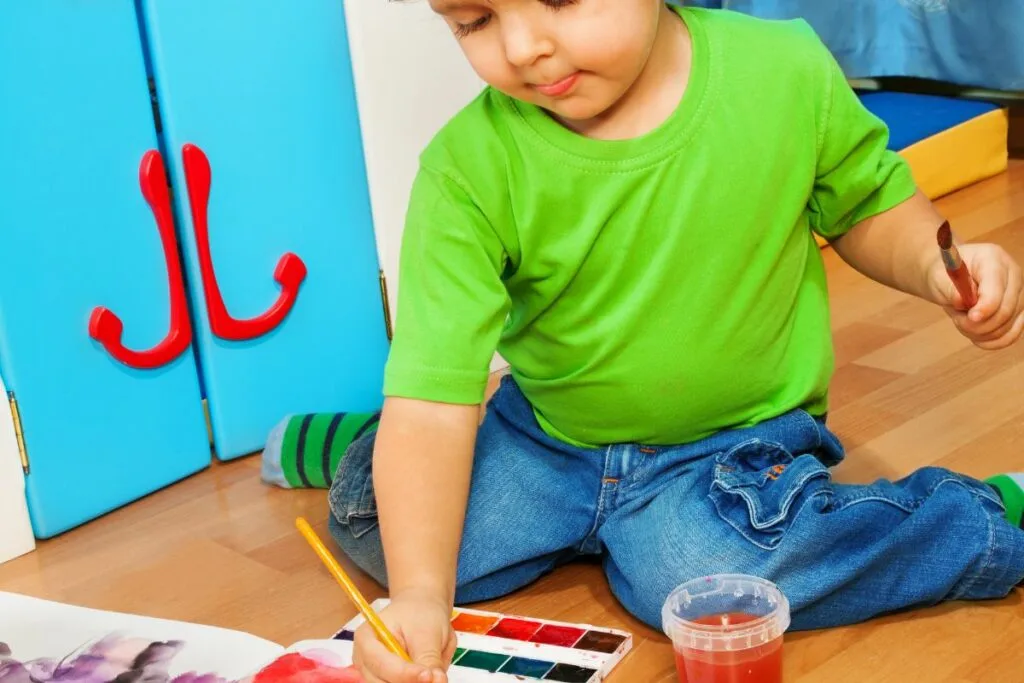Many families are becoming increasingly wary of the national education system.
They want to maintain an emphasis on academic subjects yet introduce more life skills, so homeschooling has become a viable option.

If you are a parent who wants to take more control over how your two-year-old learns, then it is worth getting some helpful advice.
In this guide, we will consider homeschooling requirements, how to organize your curriculum, and how you can succeed with homeschooling for two-year-olds.
What Is Homeschooling?
Rather than enrolling their child into the education system at a private or public school, homeschooling is another option.
Parents or private tutors take on the role of teacher and are in command of their child’s education.
Homeschooling allows for a personalized curriculum, and this can be done in two ways.
Either by opting out of institutional education altogether or enrolling your child part-time, which is offered by some private and public schools.
Homeschooling is a great option for two-year-olds if you want to start their education early rather than opting for a nursery.
The parent or private tutor can set the pace for learning and encourage certain subjects that may not be found in the traditional educational system.
For children with behavioral issues and learning difficulties, homeschooling can provide a personal, involved option. If it works, homeschooling can be the way forward all the way through high school.
Check The Homeschooling Requirements
Certain drawbacks of homeschooling can be linked to the various requirements as set by state legislation.
Though homeschooling is legal in US states, each one has its own regulations. For instance, in New York City, parents have to submit a Letter of Intent for each child they wish to homeschool each year.
Then there are the requirements for children’s attendance records to be maintained, specific home instruction plans to be provided, standardized tests conducted, and the city also requires that quarterly reports be sent.
For many parents, such detailed requirements can certainly take a lot of effort. In other regions, homeschooling a child may mean they are forbidden to take part in other activities.
In the Virginia High School League, homeschooled children are prohibited from participating in the state’s high school athletic programs.
Should your child be homeschooled, it may prove difficult to transfer those earned credits into a public high school. That’s primarily why homeschooling can prove to be such a commitment, as you may envisage homeschooling through to high school graduation.
Other homeschooling requirements are there to bring a sense of order. While you will know where your two-year-old is pretty much all the time, you may still have to keep attendance to comply with attendance law.
While evaluations and achievement tests come at a later age, we would encourage you to consider naming your homeschool.
Creating A Stimulating Learning Environment At Home
A two-year-old may find it difficult to switch from being at home to learning in an educational environment.
Create that stimulating, productive environment by removing any toys in a focused area of your home.
Populate it with relevant books, comfortable seating, and learning boards so it is obvious that this is a place to learn.
You can always re-purpose the space outside of homeschool time, yet it may make sense to keep it as it is to define it as a learning environment.
You could always re-purpose existing spaces in your home, too. That could be a class taught at the kitchen table or going all out by buying your two-year-old a desk and teaching from the blackboard.
Use a wall space to hang up calendars and schedules, and make sure that you celebrate your two-year-old’s work.
Storage space is important, so look into buying a bookshelf for your workbooks and textbooks, while a wicker basket can contain your school supplies.
Learning The Role Of Being A Teacher
Deciding to enroll your two-year-old into homeschooling is one thing, yet a parent still needs to be educated to become the teacher.
That could mean participating in an academic club or learning from community college classes.
Time is also a factor, so homeschooling can be a good option for soccer moms and those who want to teach life skills.
Experience is key, so you may want to join the local homeschool organization to find like-minded parents.
Talk to other homeschooling parents and discover what works for them. Educate yourself about their homeschooling habits and work out which age-appropriate activities you could involve your two-year-old in.
Read up about how homeschooling has developed over the years and maybe even speak to a teacher to learn their roles and responsibilities.
If you find yourself wanting to take on a job and simply do not have the time for homeschooling, then consider a private tutor.
These will come at a cost, yet you can still have some input into how your two-year-old is educated.
Choosing And Planning Your Curriculum
The national educational system used to be largely focused on writing, reading, and arithmetic.
These were considered the fundamental aspects of a child’s education, yet that’s no longer the case.
The systems of learning have changed over time, yet now you can set the standard for your two-year-old.
You can even discover the latest options for your two-year-old’s curriculum by visiting curriculum fairs.
Consider what you want your two-year-old to learn and purchase the relevant workbooks and textbooks.
The choice is yours, yet these resources are typically bought from either an online store or a mail-order catalog.
From the age of two, you could encourage your child to learn a new language or get started on writing, reading, and arithmetic.
Look to gain a balance between traditional subjects and those in which your two-year-old has a genuine interest already.

Building Lesson Plans
There are some aspects of the traditional education system that you may look into encouraging while homeschooling.
Lesson plans can introduce some order to the school day so you know what to expect in the upcoming week.
Try not to become too rigid, as you can soon discover that your two-year-old prefers certain lessons and subjects over others.
Children, especially the very young, will learn at their own pace, so try to set some goals with your lesson plans.
That could mean learning the basics of academics while encouraging physical activity. Try to look at your lesson plans in terms of the bigger picture.
See how your two-year-old goes in the classroom, yet consider the benefits of extracurricular activities like music classes to encourage their creative development, too.
Encouraging Self-Discipline In Your Two-Year-Old
During the ‘terrible twos’, it can feel like you are losing a battle by trying to encourage self-discipline.
There may be tantrums and episodes where your two-year-old continually breaks the rules. That’s why you should impose certain rules in your learning environment to prevent any disruption to the school day.
Some of these self-disciplinary rules may already be in place in your home. From no yelling to no fibbing, make sure that they are visible on the wall.
Should one of those rules be broken, then your two-year-old should be aware of the consequences. That could mean detention or a timeout, depending on what you know works best.
Self-discipline can be encouraged when a child learns the pitfalls of bad behavior, though they can learn through the reinforcement of good behavior.
Invest in sticker charts to demonstrably prove what being good looks like on a consistent basis. Treats for two-year-olds can also work wonders if a goal is there to be achieved.
The Pros And Cons Of Homeschooling
One of the primary reasons why a parent may decide to homeschool their two-year-old is how flexible it can be.
Instead of relying on an institutional, educational system that tries to shoehorn various methods, the parent is in control, though this can be via a private tutor.
That can mean teaching life skills to prepare them for the wider world as well as the three R’s.
Further benefits include how a parent can build and develop great family relationships with their child. From the age of two, a child is still learning and facing their own challenges.
With homeschooling, a parent can take responsibility for their child’s learning and help develop them as individuals too.
Aside from the clear academic benefits, there are bonuses for mental health, physical health, and social development.
There may be times when you wonder if homeschooling is the right choice for you and your two-year-old.
Drawbacks can include that seemingly unavoidable feeling of isolation, so contact a support group so you feel part of a network.
It also helps to be patient as many homeschooling parents embark on an expensive and involved curriculum. Soon enough, that can fall apart as it fails to mesh with their two-year-old’s style of learning.
Final Thoughts
Sure, the focus should be on your two-year-old’s education, yet you will also need to learn as you homeschool.
Working from home may not be for everyone, so we would encourage trying to find a system where you can be the teacher and then the parent.
Homeschooling can bring flexibility and freedom to a child’s learning, yet there are several ways to achieve that.
Find out what works and what does not work, and adapt along the way.
You may also like these outdoor water fun ideas to try with your homeschoolers.
- Homeschooling In High School: Pros And Cons - February 24, 2024
- How Do I Withdraw My Child From School To Homeschool? - February 23, 2024
- How To Not Go Crazy Homeschooling Kids: A Guide For Frazzled Parents - February 22, 2024









Leave a comment